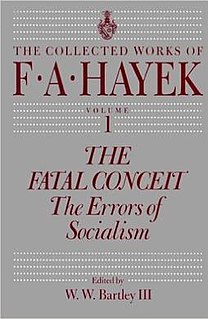Related Research Articles

Friedrich August von Hayek, often referred to by his initials F. A. Hayek, was an Austrian-British economist and philosopher who is best known for his defence of classical liberalism. Hayek shared the 1974 Nobel Memorial Prize in Economic Sciences with Gunnar Myrdal for his work on economics. His account of how changing prices communicate information that helps individuals coordinate their plans is widely regarded as an important achievement in economics, leading to his prize.
Cultural relativism is the idea that a person's beliefs and practices should be understood based on that person's own culture. Proponents of cultural relativism also tend to argue that the norms and values of one culture should not be evaluated using the norms and values of another.
Evolutionary economics is part of mainstream economics as well as a heterodox school of economic thought that is inspired by evolutionary biology. Much like mainstream economics, it stresses complex interdependencies, competition, growth, structural change, and resource constraints but differs in the approaches which are used to analyze these phenomena.
In modern literary criticism, more common with genre fiction, conceit often means an extended rhetorical device, summed up in a short phrase, that refers to a situation which either does not exist, or exists rarely, but is needed for the plot.
Dispersed knowledge in economics is the notion that no single agent has information as to all of the factors which influence prices and production throughout the system.

William James Durant was an American writer, historian, and philosopher. He became best known for his work The Story of Civilization, 11 volumes written in collaboration with his wife, Ariel Durant, and published between 1935 and 1975. He was earlier noted for The Story of Philosophy (1926), described as "a groundbreaking work that helped to popularize philosophy".
A superintelligence is a hypothetical agent that possesses intelligence far surpassing that of the brightest and most gifted human minds. "Superintelligence" may also refer to a property of problem-solving systems whether or not these high-level intellectual competencies are embodied in agents that act in the world. A superintelligence may or may not be created by an intelligence explosion and associated with a technological singularity.

Niche construction is the process by which an organism alters its own local environment. These alterations can be a physical change to the organism’s environment or encompass when an organism actively moves from one habitat to another to experience a different environment. Examples of niche construction include the building of nests and burrows by animals, and the creation of shade, influencing of wind speed, and alternation of nutrient cycling by plants. Although these alterations are often beneficial to the constructor, they are not always.
Spontaneous order, also named self-organization in the hard sciences, is the spontaneous emergence of order out of seeming chaos. It is a process in social networks including economics, though the term "self-organization" is more often used for physical changes and biological processes, while "spontaneous order" is typically used to describe the emergence of various kinds of social orders from a combination of self-interested individuals who are not intentionally trying to create order through planning. The evolution of life on Earth, language, crystal structure, the Internet and a free market economy have all been proposed as examples of systems which evolved through spontaneous order.
Sociocultural evolution, sociocultural evolutionism or cultural evolution are theories of sociobiology and cultural evolution that describe how societies and culture change over time. Whereas sociocultural development traces processes that tend to increase the complexity of a society or culture, sociocultural evolution also considers process that can lead to decreases in complexity (degeneration) or that can produce variation or proliferation without any seemingly significant changes in complexity (cladogenesis). Sociocultural evolution is "the process by which structural reorganization is affected through time, eventually producing a form or structure which is qualitatively different from the ancestral form".

David Sloan Wilson is an American evolutionary biologist and a Distinguished Professor of Biological Sciences and Anthropology at Binghamton University. He is a son of the author Sloan Wilson and co-founder of the Evolution Institute.
Dual inheritance theory (DIT), also known as gene–culture coevolution or biocultural evolution, was developed in the 1960s through early 1980s to explain how human behavior is a product of two different and interacting evolutionary processes: genetic evolution and cultural evolution. Genes and culture continually interact in a feedback loop, changes in genes can lead to changes in culture which can then influence genetic selection, and vice versa. One of the theory's central claims is that culture evolves partly through a Darwinian selection process, which dual inheritance theorists often describe by analogy to genetic evolution.
The concept of the evolution of morality refers to the emergence of human moral behavior over the course of human evolution. Morality can be defined as a system of ideas about right and wrong conduct. In everyday life, morality is typically associated with human behavior, and not much thought is given to the social conducts of other creatures. The emerging fields of evolutionary biology and in particular evolutionary psychology have argued that, despite the complexity of human social behaviors, the precursors of human morality can be traced to the behaviors of many other social animals. Sociobiological explanations of human behavior remain controversial. Social scientists have traditionally viewed morality as a construct, and thus as culturally relative; although others argue that there is a science of morality.

Dawkins vs. Gould: Survival of the Fittest is a book about the differing views of biologists Richard Dawkins and Stephen Jay Gould by philosopher of biology Kim Sterelny. When first published in 2001 it became an international best-seller. A new edition was published in 2007 to include Gould's The Structure of Evolutionary Theory finished shortly before his death in 2002, and more recent works by Dawkins. The synopsis below is from the 2007 publication.

The Fatal Conceit: The Errors of Socialism is a book written by the economist and political philosopher Friedrich Hayek and edited by the philosopher William Warren Bartley. The book was first published in 1988 by the University of Chicago Press. Economic historian Bruce Caldwell has questioned how far Bartley was the editor and how far the author.

Sources of the Self: The Making of the Modern Identity is a work of philosophy by Charles Taylor, published in 1989 by Harvard University Press. It is an attempt to articulate and to write a history of the "modern identity".
The history of evolutionary psychology began with Charles Darwin, who said that humans have social instincts that evolved by natural selection. Darwin's work inspired later psychologists such as William James and Sigmund Freud but for most of the 20th century psychologists focused more on behaviorism and proximate explanations for human behavior. E. O. Wilson's landmark 1975 book, Sociobiology, synthesized recent theoretical advances in evolutionary theory to explain social behavior in animals, including humans. Jerome Barkow, Leda Cosmides and John Tooby popularized the term "evolutionary psychology" in their 1992 book The Adapted Mind: Evolutionary Psychology and The Generation of Culture. Like sociobiology before it, evolutionary psychology has been embroiled in controversy, but evolutionary psychologists see their field as gaining increased acceptance overall.
Conscious evolution refers to the theoretical ability of human beings to be conscious participants in the evolution of their cultures, or even of the entirety of human society, based on a relatively recent combination of factors, including increasing awareness of cultural and social patterns, reaction against perceived problems with existing patterns, injustices, inequities, and other factors. The realization that cultural and social evolution can be guided through conscious decisions has been in increasing evidence since approximately the mid-19th century, when the rate of change globally began to increase dramatically. The Industrial Revolution, reactions against the effects of the Industrial Revolution, the emergence of new sciences such as psychology, anthropology, and sociology, the revolution in global communication, the interaction of diverse cultures through transportation and colonization, anti-slavery and suffrage movements, and increasing lifespan all would contribute to the growing awareness of social and cultural patterns as being potentially subject to conscious evolution.
Cultural group selection is an explanatory model within cultural evolution of how cultural traits evolve according to the competitive advantage they bestow upon a group. This multidisciplinary approach to the question of human culture engages research from the fields of anthropology, behavioural economics, evolutionary biology, evolutionary game theory, sociology, and psychology.
There are two main approaches currently used to analyze archaeological remains from an evolutionary perspective: evolutionary archaeology and behavioral ecology. The former assumes that cultural change observed in the archaeological record can be best explained by the direct action of natural selection and other Darwinian processes on heritable variation in artifacts and behavior. The latter assumes that cultural and behavioral change results from phenotypic adaptations to varying social and ecological environments.